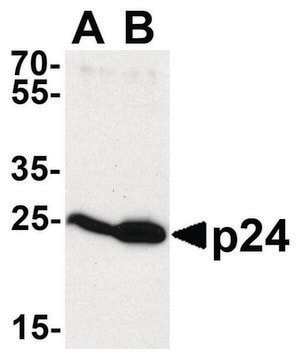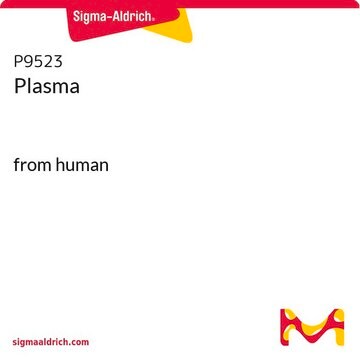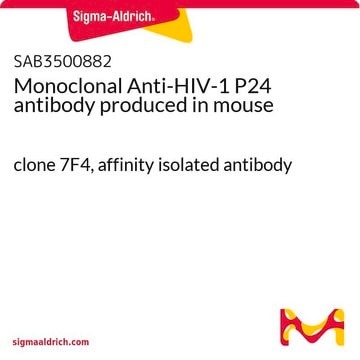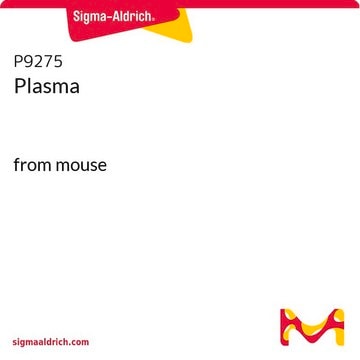H0160
HIV-1 gag
≥95% (SDS-PAGE), recombinant, expressed in E. coli, Galactosidase-tagged
Sinónimos:
p24 HIV antigen
Iniciar sesiónpara Ver la Fijación de precios por contrato y de la organización
About This Item
Productos recomendados
recombinante
expressed in E. coli
Nivel de calidad
Análisis
≥95% (SDS-PAGE)
mol peso
39 kDa (plus 114 kDa β-Gal tag)
concentración
1 mg/mL
Nº de acceso UniProt
temp. de almacenamiento
−20°C
Información sobre el gen
human immunodeficiency virus 1 ... gag(155030)
Descripción general
Contains amino acid residues [77-436] of HIV-1 gag antigen.
The human immunodeficiency virus 1 (HIV−1) gag antigen is a recombinant 39 kDa protein encoded by the GAG gene of the human immunodeficiency virus (HIV) type I expressed in and isolated from Escherichia coli. It has a β−galactosidase tag (114 kDa) on the N−terminus. HIV-1 Gag exists as monomers or lower-order oligomers in the cytosol. At the plasma membrane, it forms higher-order multimers.
Aplicación
HIV-1 gag has been used in the coculture with an autologous cluster of differentiation T (CD4+ T) to study the ability of monocyte-derived dendritic cells (MDC1) to induce human immunodeficiency virus 1 (HIV−1) latency reversal (LR).
Acciones bioquímicas o fisiológicas
The human immunodeficiency virus 1 (HIV−1) gag (p24) antigen reacts strongly with HIV positive serum and may be used as a positive control for evaluating antibodies to HIV. At transcription sites, HIV-1 Gag creates ribonucleoprotein complexes with unspliced viral RNA. The HIV-1 Gag protein is accountable for packaging genomic RNA (gRNA) and the assembly of immature viral particles.
Positive control for HIV antibodies.
Forma física
Solution in 8 M urea, 20 mM Tris-HCl, pH 8.0, 10 mM 2-mercaptoethanol.
Código de clase de almacenamiento
10 - Combustible liquids
Clase de riesgo para el agua (WGK)
WGK 2
Punto de inflamabilidad (°F)
Not applicable
Punto de inflamabilidad (°C)
Not applicable
Certificados de análisis (COA)
Busque Certificados de análisis (COA) introduciendo el número de lote del producto. Los números de lote se encuentran en la etiqueta del producto después de las palabras «Lot» o «Batch»
¿Ya tiene este producto?
Encuentre la documentación para los productos que ha comprado recientemente en la Biblioteca de documentos.
Samantha Sarni et al.
The Journal of biological chemistry, 295(42), 14391-14401 (2020-08-21)
The HIV-1 Gag protein is responsible for genomic RNA (gRNA) packaging and immature viral particle assembly. Although the presence of gRNA in virions is required for viral infectivity, in its absence, Gag can assemble around cellular RNAs and form particles
C T Wang et al.
Journal of medical virology, 59(2), 180-188 (1999-08-25)
The incorporation of human immunodeficiency virus type 1 (HIV-1) Gag-beta-galactosidase (Gag-beta-gal; GBG) fusion proteins into HIV virus-like particles in the presence of HIV Gag proteins was studied. HIV Gag-beta-gal fusion constructs were cotransfected individually into COS7 cells with or without
Xiaoling Zhang et al.
Cancer biology & medicine, 17(2), 418-432 (2020-06-27)
Objective: Bevacizumab is a recombinant humanized monoclonal antibody that blocks vascular endothelial growth factor (VEGF) with clear clinical benefits. However, overall survival of some cancer types remains low owing to resistance to bevacizumab therapy. While resistance is commonly ascribed to
Kevin M Tuffy et al.
Viruses, 12(11) (2020-11-14)
The ability of the retroviral Gag protein of Rous sarcoma virus (RSV) to transiently traffic through the nucleus is well-established and has been implicated in genomic RNA (gRNA) packaging Although other retroviral Gag proteins (human immunodeficiency virus type 1, HIV-1;
Jan Kristoff et al.
EBioMedicine, 43, 295-306 (2019-04-07)
Despite the success of antiretroviral therapy (ART), latent HIV-1 continues to persist in a long-lived population of resting memory CD4+ T cells within those who are infected. Finding a safe and effective means to induce latency reversal (LR) during ART
Nuestro equipo de científicos tiene experiencia en todas las áreas de investigación: Ciencias de la vida, Ciencia de los materiales, Síntesis química, Cromatografía, Analítica y muchas otras.
Póngase en contacto con el Servicio técnico








